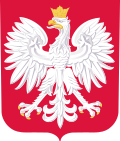  | |
| United Nations membership | |
|---|---|
| Represented by |
|
| Membership | Full member |
| Since | 24 October 1945 |
| UNSC seat | Non-permanent |
| Permanent Representative | Joanna Wronecka |
 |
|---|
Poland is one of the 51 original members of the United Nations that signed the United Nations Charter on 15 October 1945 and the Declaration by United Nations on 1 January 1942. Since joining the world body, Poland contributes to the United Nations such as peacekeeping missions, with several Polish officers put in charge of thousands of troops forming international contingents in Lebanon and the Golan Heights. In addition, Poland sat on the United Nations Security Council as a non-permanent member six times (1946–1947, 1960, 1970–1971, 1982–1983, 1996–1997, 2018–2019).